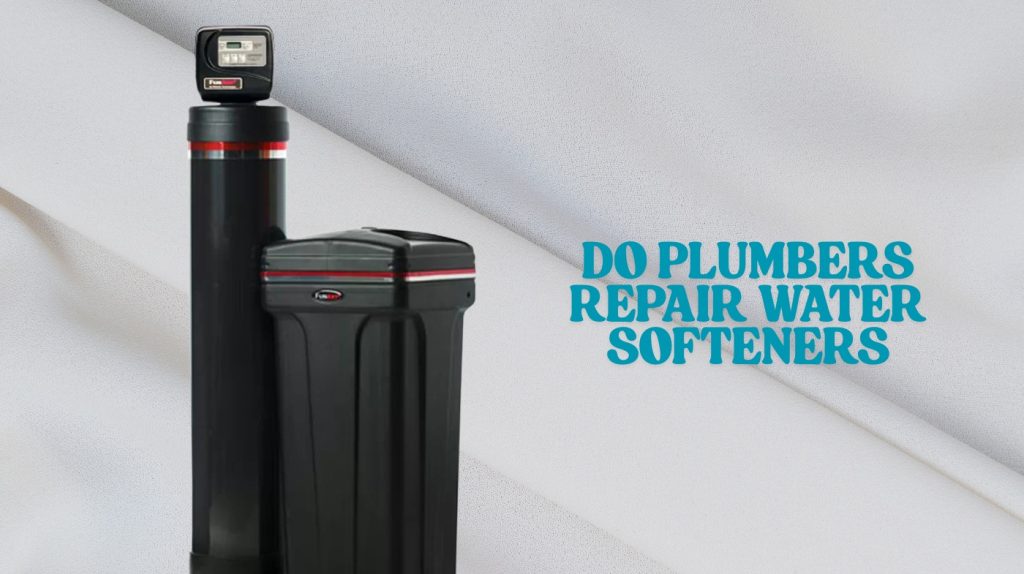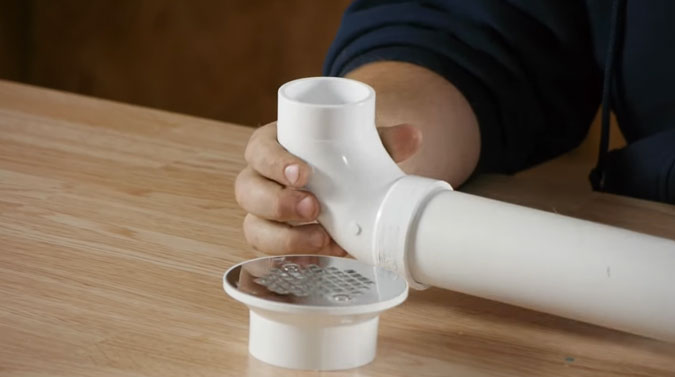Last Updated on June 8, 2025
Yes, plumbers often repair water softeners since they understand plumbing systems and possess the necessary tools and certifications. They can troubleshoot issues like salt bridging, valve malfunctions, or leaks, perform maintenance such as cleaning brine tanks, and replace worn parts.
Some specialize in water treatment, ensuring repairs meet safety and efficiency standards. If you want to know when to opt for repair or replacement and how to hire a qualified expert, keep exploring the details.
Key Takeaways
- Many general plumbers are qualified to diagnose and repair common water softener issues.
- Specialized plumbing companies offer deeper expertise in water softener repair and maintenance.
- Plumbers handle repairs like fixing leaks, salt bridging, timer faults, and resin bead cleaning.
- Proper certification and training ensure plumbers can safely and effectively repair water softeners.
- Hiring licensed plumbers with water treatment experience guarantees compliant and reliable system repairs.
Types of Plumbers Who Handle Water Softener Repairs
Although many plumbers focus on general plumbing tasks, several specialized professionals handle water softener repairs. You’ll find general plumbing contractors capable of repairing water softeners, but companies specializing in these systems, such as Pacific Plumbing & Drain, often offer deeper expertise.
These experts manage everything from diagnosing to restoring system functionality, ensuring a prompt repair turnaround. Understanding the differences between submersible and external pumps can also aid in selecting the right components during repairs.
Specialized plumbers often provide deeper expertise in water softener repairs beyond general plumbing services.
Heating and cooling specialists with plumbing services, like Sunset Heating & Cooling, also provide these repairs, integrating HVAC and water treatment knowledge.
National chains, including Mr. Rooter Plumbing, deliver consistent service across locations, while local contractors like Service Plus Plumbing may offer same-day water softener repairs.
When selecting a plumber, verify they possess technical knowledge, hands-on experience, and brand-specific familiarity to diagnose issues accurately and execute repairs efficiently. This specialized skill set guarantees your water softener operates at its best, maintaining water quality and system longevity.
Common Issues Found in Water Softener Systems
When you rely on a water softener, recognizing common system issues is crucial to maintaining peak performance and water quality. You might encounter problems related to insufficient softening, excessive salt use, or regeneration failures.
Salt-related complications such as salt bridging or mushing can also impair system efficiency. Additionally, water quality issues like discoloration or residual hardness indicate softener malfunction.
Here are three common issues to watch for:
- Regeneration Disruptions – Faulty timers, clogged valves, or low salt levels can halt the regeneration process, reducing softening effectiveness. Regular maintenance checks can help identify and resolve these issues before they worsen.
- Salt Compaction – Salt bridging and mushing create hard layers or sludge, preventing proper salt dissolution. These problems can cause pressure issues similar to those caused by worn-out valves in plumbing systems.
- System Sizing and Installation – Incorrect sizing or poor installation leads to inefficiencies, affecting water quality and increasing maintenance needs.
Leaks arising from worn or damaged O-rings and cracked valves are also frequent problems, often requiring prompt repair to prevent water damage and maintain system function common leak sources.
Step-by-Step Process for Repairing Water Softeners
Before you begin repairing a water softener, you must understand its key components and gather the necessary tools. Locate the control head, manifold tube, resin beads, gravel, and brine tank.
Assemble pliers, wrenches, PVC cutter, primer, cement, and electrical tape. It is important to test water hardness both before and after repair to ensure the system functions correctly.
First, engage the bypass valve to stop water flow, then run a manual regeneration cycle to relieve pressure. Check salt levels and identify clogs in the manifold tube. Inspect the control head for proper function.
Next, clean the brine tank, break up salt bridges, and clear salt mushes. Clean the resin beads and venturi valve to maintain efficiency. If needed, replace faulty components and rebuild the manifold.
Finally, check all connections for leaks, reassemble the system per manufacturer’s instructions, and test functionality thoroughly.
When to Repair Versus Replace Your Water Softener?
After following the detailed steps to repair your water softener, you need to assess whether continued repairs are practical or if replacement is more economical.
Consider these key factors:
- Age and Efficiency: If your unit is over 10-15 years old and shows decreased water quality or frequent breakdowns, replacement is advisable due to declining efficiency. The typical lifespan of a water softener is around 10 to 25 years, so age is a crucial factor in decision-making. Additionally, older units may lack compatibility with modern battery backup systems that enhance reliability during power outages.
- Repair Costs: Apply the 50% rule—if repair expenses exceed half the cost of a new system (around $1,500), replacing the unit is cost-effective.
- Performance Indicators: Persistent hard water stains, rough laundry, or reduced water pressure after maintenance suggest the system can no longer meet demands & replacement.
How to Find and Hire a Qualified Water Softener Repair Specialist?
To guarantee effective water softener repair, verify the specialist’s certifications, licenses, and documented experience with water treatment systems. Certification earned can be promoted to customers to demonstrate professionalism and credibility.
Compare detailed quotes that outline services, costs to make an informed decision. Prioritize professionals who demonstrate technical expertise and transparent pricing to avoid unexpected expenses.
Additionally, ensure the repair technician follows safety precautions such as turning off power supplies and wearing protective gear during maintenance.
Verifying Credentials and Experience
When you need a qualified water softener repair specialist, verifying their credentials and experience is crucial to guarantee reliable service and compliance with industry standards.
Start by confirming they hold relevant certifications, such as Water Quality Association’s Certified Installer (CI) or Certified Water Specialist (CWS). These certifications require passing a comprehensive exam and adherence to the WQA Code of Ethics, ensuring professionalism and knowledge in water treatment.
Additionally, understanding common issues like clogged or dirty filters can enhance their troubleshooting effectiveness. Next, ensure they possess appropriate state licenses, like those from the Texas Commission on Environmental Quality (TCEQ), to meet local regulatory requirements.
Finally, assess their practical experience—look for at least six months in water softener installation, maintenance, and repair, coupled with demonstrated troubleshooting skills. For technicians with less experience, prerequisite training courses may be necessary to build foundational skills.
This three-step verification ensures your specialist understands mechanical systems, adheres to safety and code regulations, and stays updated on industry innovations. Only then can you trust their capability to deliver effective, compliant water softener repairs.
Comparing Quotes and Services
Verifying credentials and experience sets the foundation for selecting a water softener repair specialist, but evaluating quotes and service offerings helps you make an informed hiring decision. Obtain multiple detailed estimates covering labor, parts, diagnostics, and potential extras.
Keep in mind that labor costs vary from $45 to $150 per hour, which can significantly impact the total expense. Review service inclusions such as diagnostics, cleaning, part replacement, and maintenance plans.
Some pumps integral to water systems, like sump pumps, require specialized repair knowledge due to their unique operational characteristics. Confirm coverage on parts and labor to safeguard your investment.
Consider local providers for faster response and possibly lower labor rates, but weigh national chains for standardized pricing and specialized parts access. Ensure clarity in scope of work and timelines before committing.
This methodical comparison ensures you engage a qualified specialist offering transparent, comprehensive, and cost-effective water softener repair services.
Frequently Asked Questions
Can I Perform Basic Water Softener Maintenance Myself?
Yes, you can perform basic water softener maintenance yourself. Tasks like inspecting salt levels, cleaning the exterior with mild soap and warm water, checking for salt bridges, and replenishing salt are straightforward.
You don’t usually need special tools for these steps. Just make sure you follow the manufacturer’s instructions and avoid harsh chemicals. Regular upkeep prevents issues like leaks and hard water return, keeping your system efficient and reliable.
How Often Should a Water Softener Be Serviced Professionally?
You should schedule professional water softener service annually to maintain peak performance, prevent malfunctions, and extend system lifespan. Professionals clean and recharge the resin tank, sanitize the brine tank, check valves and settings, and inspect for salt bridging or leaks.
While you can handle monthly salt checks and leak inspections, relying on expert service once a year ensures thorough maintenance and avoids costly repairs caused by overlooked issues.
What Are the Environmental Impacts of Using Water Softeners?
You should know that traditional water softeners release salt and chemicals into the environment, increasing water salinity and harming aquatic life. This salt buildup affects plant health by restricting root absorption.
Additionally, organic compounds and hydrocarbons can leach into water, impacting quality. The regeneration process produces waste contributing to pollution. To minimize these effects, consider salt-free or eco-friendly systems and implement water conservation and energy-efficient practices.
Are There Alternatives to Salt-Based Water Softeners?
Salt-based softeners remove minerals but raise sodium levels. Salt-free alternatives prevent scale without altering water composition. You can choose systems like Springwell Futuresoft or Kind E-2000, which use Template Assisted Crystallization or magnetic technology.
These eco-friendly options conserve water, require less maintenance, and preserve water pressure. If you want effective mineral control without environmental drawbacks, salt-free water conditioners offer a precise, low-impact solution for your home.
Does Water Softener Repair Affect Home Water Pressure?
Yes, repairing your water softener directly affects your home’s water pressure. If resin beads clog or valves malfunction, you’ll notice reduced flow or pressure drops.
Fixing these issues, through cleaning, replacing components, or system upgrades restores peak water flow. Regular maintenance prevents buildup and blockages that cause pressure inconsistencies.
Behind the Scenes: What Plumbers Actually Do During a Repair?
When your water softener acts up, don’t wait for it to flood your whole house—plumbers with water softener expertise are your go-to professionals. By understanding common issues and repair steps, you’ll know when fixing is smarter than replacing.
Hiring a qualified specialist guarantees efficient, cost-effective service without wasting time. Armed with this knowledge, you’ll confidently tackle any water softener problem, avoiding headaches that could feel as endless as the ocean itself.


